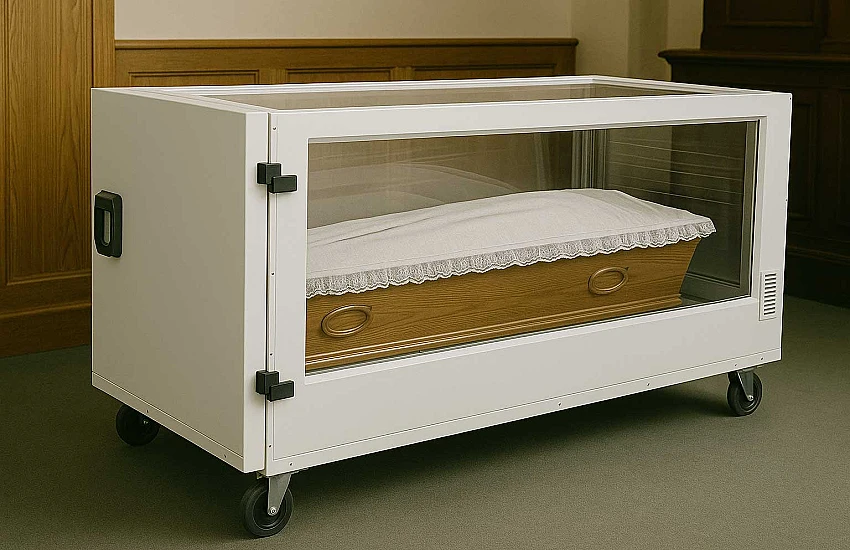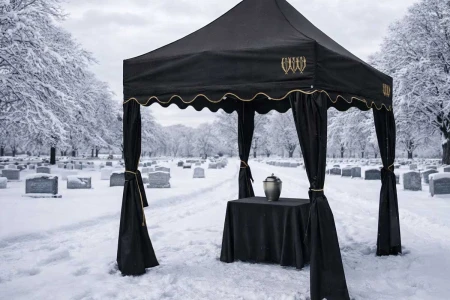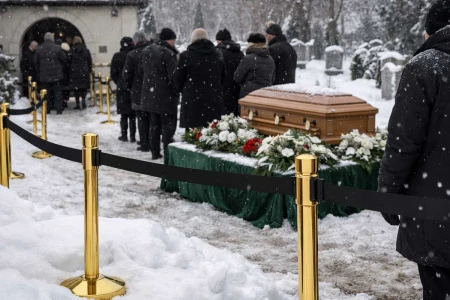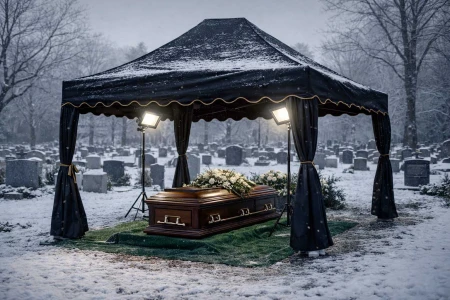Table of Contents
- The Role of Modern Equipment in the Funeral Industry
- Elements of Complete Funeral Home Equipment
- Refrigerated Catafalque – Innovative Solution in Service of Dignity
- Technology and Functionality of Modern Refrigeration Devices
- Work Ergonomics of Funeral Home Staff
- Sanitary Requirements and Professional Equipment
- Aesthetics and Dignity in Funeral Space
- Technological Development in the Funeral Industry
- Investment in Quality as Foundation of Building Trust
- Comprehensive Prima-Tech Offer for the Funeral Industry
- The Future of the Funeral Industry in Context of Technical Equipment
- The Role of Equipment in Building Professional Establishment Image
- Training and Staff Competencies in Context of Modern Equipment
- Holistic Approach to Funeral Home Equipment
- Summary – Investment in the Future of the Funeral Industry
- Frequently Asked Questions (FAQ)
In funeral services, dignity, professionalism, and respect for the deceased and their families form the foundation of every funeral home's operation. Funeral homes are no longer just places handling formalities related to death – they are modern facilities that, through appropriate equipment and funeral supplies, ensure the highest standards of care for the deceased and comfort for families going through difficult times. Professional refrigeration infrastructure represents a key element of every funeral home – it not only meets sanitary requirements but also allows for dignified storage and presentation of the deceased's body.
The Role of Modern Equipment in the Funeral Industry
The contemporary funeral industry is subject to constant changes that force funeral homes to adapt to increasingly higher standards. Funeral home equipment is not just a matter of meeting legal or sanitary requirements – it's also an element of building the image of a professional company that cares about every detail. Families using funeral services today expect comprehensive service, conducted with empathy but also utilizing modern technical solutions.
Investment in high-quality funeral equipment directly translates into the quality of services provided. We're talking about a wide range of devices and funeral accessories – from basic elements of funeral chapel furnishings, through transport trolleys and stretchers, to technologically advanced refrigeration devices. Each of these elements plays an important role in the service chain, and their quality and functionality have a direct impact on the experience of grieving families and the efficiency of staff work.
A funeral home equipped with professional equipment is a place where tradition meets modernity. On one hand, we have respect for funeral ceremonies and rituals that require an appropriate aesthetic environment. On the other hand, technical and sanitary aspects cannot be neglected – they require the use of devices meeting rigorous safety and hygiene standards.

Elements of Complete Funeral Home Equipment
Complete funeral home equipment includes many diverse elements that can be divided into several key categories. The first of these constitutes transport and movement devices, such as funeral trolleys, transport stretchers, or scissor lift trolleys. The latter enjoy particular popularity due to their ergonomic features – they allow raising and lowering the casket without excessive physical effort from staff. Terrain trolleys, on the other hand, prove excellent during ceremonies taking place in hard-to-reach locations, where standard funeral equipment might fail.
Another category is funeral chapel and ceremonial hall furnishings. We're talking here about ceremonial catafalques, bases for caskets and urns, wreath stands, or decorative elements that create the appropriate atmosphere during ceremonies. Each of these elements should be characterized not only by solid construction but also by an aesthetic appearance that harmonizes with the solemnity of the moment.
Technical equipment cannot be forgotten, which, although less visible to families of the deceased, is absolutely necessary for proper facility operation. Here we should mention embalming tables, thanatopraxy equipment, preparations and disinfectants, and – particularly important – refrigeration systems. The latter deserve special attention because they form the foundation of professional service in terms of body storage.
Refrigeration infrastructure in a funeral home is not homogeneous. Facilities can have various solutions – from large cold rooms with many spaces, through refrigeration chambers, to compact refrigerated catafalques that combine the storage function with presentation capability. It's precisely these latter devices that are gaining increasing popularity, especially in smaller establishments or as a complement to larger refrigeration infrastructure.
Refrigerated Catafalque – Innovative Solution in Service of Dignity
The refrigerated catafalque is a device that revolutionizes the way funeral homes can combine technical aspects with ceremonial requirements. In traditional understanding, a catafalque is a decorative platform or base on which, during funeral ceremonies, the casket with the deceased's body is placed. Contemporary refrigerated catafalques go a step further – they not only fulfill a ceremonial function but also ensure appropriate storage conditions that are crucial from a sanitary and ethical point of view.
The importance of proper body storage can hardly be overestimated. Temperature conditions have a direct impact on the rate of decomposition processes, and thus on the possibility of dignified presentation of the body during farewell ceremonies. In situations where several days pass between death and burial, or when the family needs more time to organize the ceremony, appropriate refrigeration conditions become absolutely necessary.
The refrigerated catafalque combines these two functions in one device. Its construction has been designed to ensure optimal technical conditions while maintaining aesthetics and dignity. The upper part of the device, usually glazed, allows family and loved ones a final farewell with the deceased in an intimate atmosphere, while the lower part houses an advanced refrigeration system that maintains the appropriate temperature.
This solution is particularly valued in smaller funeral homes, where space constitutes a significant limitation. Instead of investing in a large cold room and separate ceremonial catafalques, the establishment can equip itself with a compact refrigerated catafalque that fulfills both functions. This is not only space savings but also the possibility of ensuring a more intimate farewell atmosphere, which for many families is a value difficult to overestimate.
Technology and Functionality of Modern Refrigeration Devices
Contemporary refrigeration devices for the funeral industry are the result of advanced engineering work that must take into account the specific requirements of this sector. It's not enough to simply lower the temperature – the system must be designed to ensure uniform cold distribution, stability of operating parameters, and safety of use.
The refrigerated catafalque for one body, such as the one available in Prima-Tech's offer, represents an excellent example of well-thought-out technical design. The device is made of insulated panels, whose outer layer is painted galvanized sheet metal, while the interior is covered with stainless steel. Such choice of materials is not accidental – stainless steel is the standard in devices having contact with deceased bodies, because it's easy to clean, resistant to corrosion, and meets the highest sanitary requirements.
The cooling system in such devices consists of two key elements. The air cooler, usually mounted in the upper part of the catafalque, is responsible for uniform distribution of cold air throughout the chamber. The refrigeration unit, placed in the lower part or – in some configurations – at the back of the device, generates cold and maintains stable temperature parameters. Such construction eliminates the problem of uneven cooling, which could lead to undesirable effects.
The temperature range in professional refrigerated catafalques is usually adjustable from zero to ten degrees Celsius. In standard configuration, such range is completely sufficient to maintain proper storage conditions. Some models offer the possibility of extending the range to sub-zero temperatures, which can be useful in special cases, for example when the storage period needs to be longer or when ambient temperatures are elevated.
The safety aspect is another element that has been carefully considered in modern refrigerated catafalques. Chamber doors are usually equipped with a snap lock that can be locked with a key, which protects against unauthorized access. Equally important, there is the possibility of opening the doors from inside – this seemingly strange requirement stems from safety regulations and is meant to protect against tragic situations. Although the scenario of someone being accidentally locked inside the chamber seems unlikely, designers don't leave this aspect to chance.
Work Ergonomics of Funeral Home Staff
Work in the funeral industry involves many challenges, not only emotional but also physical. Funeral home staff daily perform activities requiring great effort – transporting bodies, moving caskets, arranging the deceased in ceremonial halls. Appropriate funeral home equipment should take into account ergonomic aspects, which not only facilitate work but also protect workers' health.
Modern refrigerated catafalques are designed with ease of use in mind. They are equipped with main and auxiliary trolleys that enable quick loading and unloading of the body without the need for direct lifting. Wheels with brakes allow the device to be moved in case of necessary space reorganization, while ensuring stable positioning during use. Such solutions significantly reduce the risk of lifting-related injuries and facilitate maintaining order and cleanliness in the establishment.
It's also worth noting the possibility of configuring the device according to individual establishment needs. Some models of refrigerated catafalques allow choosing the location of the refrigeration unit – it can be positioned on top of the device or at the back, which offers the possibility of optimal use of available space. In small premises, such flexibility can prove fundamental to the functionality of the entire establishment.
Additional accessories, such as stainless steel trays or hydraulic trolleys with foot pumps, further extend the functionality of basic equipment. The stainless steel tray facilitates cleaning and hygiene maintenance, while the hydraulic trolley reduces loads associated with lifting. These seemingly minor elements in practice have enormous importance for staff's daily work, affecting the establishment's operational efficiency and workers' psychological comfort, who can perform their duties with greater fluidity.
Sanitary Requirements and Professional Equipment
The funeral industry is subject to strict sanitary regulations that regulate both the way of handling bodies and requirements regarding funeral home infrastructure. The Ministry of Health regulation on handling corpses and human remains specifies detailed requirements that premises and devices used for body storage must meet.
The key aspect is maintaining appropriate temperature conditions, which prevent microorganism development and slow decomposition processes. Cold rooms and catafalques must ensure stable temperature in the required range, and their construction must enable easy and effective disinfection. Stainless steel, which is the standard in this type of device, is not chosen by chance as the preferred material – its smooth surface doesn't retain dirt, and resistance to disinfectants allows regular, intensive sanitization without risk of damaging equipment.
Sanitary procedures in funeral homes include not only surface cleaning but also regular technical inspections of devices. Refrigeration systems require servicing that ensures their reliability and maintenance of proper operating parameters. A refrigeration device failure in a funeral home is not just a technical problem but also a serious sanitary and ethical issue. Therefore, investment in high-quality equipment, backed by manufacturer's warranty and service availability, is a crucial decision for every funeral establishment.
It's also worth mentioning the importance of equipment documentation and certification. Devices such as refrigerated catafalques, manufactured in Poland by renowned producers, meet European standard requirements and are covered by appropriate warranties. Standard warranty usually includes twenty-four months on the device structure and twelve months on the refrigeration system, which gives funeral homes certainty of long-term, trouble-free use.

Aesthetics and Dignity in Funeral Space
While technical and sanitary aspects of funeral home equipment are the foundation of professionalism, the aesthetic dimension cannot be forgotten, which has a direct impact on grieving families' experience. Ceremonial halls, funeral chapels, and places of final farewell should be furnished in a way that combines the solemnity of the moment with comfort for ceremony participants.
The refrigerated catafalque with glazed upper part represents an interesting example of combining technical functionality with form elegance. The glazing allows dignified presentation of the deceased's body while maintaining discretion in the lower part of the device, where the refrigeration system is hidden. Such construction means that the family can spend final moments with their loved one in an intimate atmosphere, without being exposed to the sight of technical elements that, although necessary, shouldn't dominate in this particular moment.
For establishments that place particular importance on aesthetics, versions of catafalques with wooden casing are available. Wood is a material that has been associated with solemnity and tradition for centuries, and its warm color introduces an atmosphere of calm into ceremonial space. Wooden finishing of the refrigerated catafalque allows maintaining all technological advantages of a modern device while meeting aesthetic expectations of the most demanding clients.
Arranging funeral space is an art of subtle balance. On one hand, premises must be functional and meet technical requirements; on the other hand, they should create an atmosphere conducive to reflection and farewell. Appropriately selected funeral home equipment, from lighting through furniture to decorative elements, composes a coherent whole that supports families in the most difficult moments of their lives.
Technological Development in the Funeral Industry
The funeral industry, although it might seem traditional and resistant to change, is actually undergoing dynamic technological development. Investments in modern funeral equipment are no longer an option but a necessity for establishments that want to maintain competitiveness and meet growing customer expectations. Families using funeral services are increasingly aware of standards and often compare offers from different establishments, paying attention not only to ceremonial aspects but also to conditions in which their loved ones' bodies are stored.
Modern refrigeration devices are just one example of innovations changing the face of the industry. Technological development also includes temperature management systems with precise parameter control, ergonomic transport solutions, or advanced preparations used in thanatopraxy. All these elements compose a service offer that is worthy of the 21st century.
It's worth noting that Polish manufacturers of funeral home equipment, such as Prima-Tech, have achieved a level that allows them to compete in European markets. Products such as the refrigerated catafalque for one body are an example of high-quality domestic products that combine construction solidity with well-thought-out technical solutions and attractive aesthetic form. Country of production – Poland – is increasingly becoming synonymous with quality in the funeral industry, and Polish manufacturing companies are gaining recognition not only in the domestic market.
The development of funeral accessories offerings also includes the possibility of individual equipment adaptation to specific establishment needs. Flexibility in device configuration, the possibility of ordering additional functions, or choice of aesthetic variants mean that each funeral home can create a unique work environment, perfectly adapted to its specificity and service philosophy.
Investment in Quality as Foundation of Building Trust
Decisions regarding funeral home equipment are not just technical or organizational matters – they are also strategic decisions that affect the company's market position. Families entrusting the funeral home with care of their loved one expect professionalism, which includes both empathetic service and appropriate technical conditions. Visible investments in high-quality equipment build trust and testify to serious approach to the profession performed.
The refrigerated catafalque is an investment that pays dividends on many levels. First, it ensures compliance with all sanitary and legal requirements, which is the foundation of legal business operation. Second, it offers families the possibility of dignified farewell in controlled, comfortable conditions. Third, it increases the establishment's operational efficiency, allowing handling of a larger number of ceremonies without compromising quality. Finally, it constitutes an element of building the company's positive image as a modern, well-equipped funeral home.
It's also worth noting that investment in durable, high-quality funeral equipment is a cost-effective solution in the long term. Devices such as refrigerated catafalques, manufactured from solid materials and covered by manufacturer's warranty, serve for many years without need for replacement. Availability of technical service and possibility of purchasing spare parts ensure that even in case of failure, the device can be quickly restored to working condition, minimizing establishment downtime.
Comprehensive Prima-Tech Offer for the Funeral Industry
Choosing a funeral home equipment supplier is a decision that should be preceded by analysis of available offerings and manufacturer reputation. Prima-Tech company, distributor and manufacturer of equipment for the funeral industry, offers a comprehensive product range that includes almost all elements necessary for equipping a modern funeral home.
The offer includes not only refrigerated catafalques but also funeral trolleys of various types, transport stretchers, embalming tables, casket racks, and a wide range of funeral accessories. Such comprehensiveness of the offer allows funeral homes to make purchases from one verified supplier, which simplifies logistics and often also warranty or service matters.
Particularly noteworthy is the possibility of individual device adaptation to establishment needs. The refrigerated catafalque can be ordered with different refrigeration unit configurations, extended temperature range, or additional accessories. Professional advice from the manufacturer helps in selecting optimal configuration, taking into account room specifics, planned number of ceremonies, and establishment's aesthetic preferences.
Contact with the company is simple and direct – establishments can place orders through the website funeraryaccesories.com or contact the office in Kolonia Poczesna by phone. The possibility of direct conversation with manufacturer representatives and visiting the production facility provides additional assurance about the quality of offered products.
The Future of the Funeral Industry in Context of Technical Equipment
Looking to the future, further technological development in the funeral industry can be expected. Demographic changes, growing customer expectations, and evolution of legal regulations will influence the shape of funeral home offerings. Technical equipment, including refrigeration systems, will likely evolve toward even greater energy efficiency, ease of use, and integration with establishment management systems.
Growing importance of funeral space individualization can also be predicted. Families increasingly expect the possibility of personalizing farewell ceremonies, which requires establishments to be flexible in space arrangement. Equipment such as mobile refrigerated catafalques that can be easily moved and adapted to different ceremonial hall configurations will respond to these needs.
Development of ecological awareness may also affect the funeral industry. Energy-efficient refrigeration devices using ecological refrigerants may become standard not only for economic reasons but also as an element of establishments' environmental responsibility. Such solutions will respond to expectations of an increasingly numerous group of clients who pay attention to ecological aspects also when choosing funeral services.

The Role of Equipment in Building Professional Establishment Image
In the competitive environment of the funeral industry, the professional image of a funeral home becomes a key differentiating factor. Families seeking funeral services often rely on recommendations but also on their own observation of standards offered by individual companies. Visiting the establishment, viewing ceremonial halls, becoming familiar with available equipment – all this influences the final decision to choose a specific company.
Modern, aesthetic equipment signals that the funeral home takes its business seriously and invests in the quality of services provided. Visible presence of professional equipment, such as refrigerated catafalques or ergonomic transport trolleys, gives families certainty that their loved one will be cared for at the highest level. This is particularly important at a time when families are in a state of particular vulnerability and need assurance that they are making the right decision.
Marketing in the funeral industry differs from promotion in other sectors, but professional equipment can constitute a significant element of marketing communication. Photos of modern ceremonial halls, information about applied refrigeration technologies, or quality accreditations and certificates are elements that can be used in establishment promotional materials. Of course, communication must be conducted with appropriate sensitivity and tact, but at the same time there's no reason to hide the company's technical and organizational advantages.
Training and Staff Competencies in Context of Modern Equipment
Even the best funeral home equipment won't bring expected results if staff isn't properly trained in its operation. Contemporary devices, such as refrigerated catafalques with advanced temperature control systems, require knowledge of operating principles, maintenance procedures, and ability to respond quickly in case of failure.
Funeral equipment manufacturers increasingly offer training for funeral home staff. Such training covers not only technical aspects of device operation but also issues related to work safety, hygiene, and behavior procedures in various situations. Investment in employee competency development is as important as investment in devices themselves – only the combination of good equipment with qualified staff guarantees achievement of the highest standards.
It's also worth paying attention to the importance of technical documentation and operating instructions. Modern devices should be supplied with complete instructions in English that explain in an accessible way the principles of use, maintenance, and solving typical problems. Access to technical support from manufacturer or distributor is another element that increases the value of investment in professional equipment.
Holistic Approach to Funeral Home Equipment
When making decisions about funeral home equipment purchases, it's worth adopting a holistic perspective that takes into account mutual connections between different infrastructure elements. The refrigerated catafalque doesn't function in isolation from other devices – it cooperates with transport trolleys that facilitate loading, with room ventilation systems that ensure proper air exchange, or with ceremonial hall furnishings that create the totality of experience for families.
When planning modernization or launching a new funeral home, it's worth creating a comprehensive investment plan that takes into account all necessary elements and their mutual relationships. Consultations with experienced suppliers, such as Prima-Tech, can help identify the optimal set of devices and their placement in available space. Such strategy allows avoiding later needs for modifications or additional equipment, which can be costly and time-consuming.
Summary – Investment in the Future of the Funeral Industry
Funeral home equipment is the foundation of professional activity in the funeral industry. The refrigerated catafalque, as a key element of refrigeration infrastructure, illustrates broader trends in industry development – pursuit of combining technical functionality with aesthetics, care for dignity of the deceased and comfort of families, as well as use of modern technologies to raise service standards.
Investment in high-quality funeral equipment, such as the refrigerated catafalque for one body available in funeraryaccesories.com is not just an expense but a strategic decision that affects the establishment's market position, customer satisfaction, and operational efficiency. In times when competition in the funeral industry is growing and family expectations are becoming increasingly high, professional equipment ceases to be a luxury and becomes a necessity.
Funeral homes that invest in modern equipment, staff training, and continuous improvement of service standards build their future on solid foundations. Dignity, respect, and professionalism – these values that have always been the essence of the funeral industry, today also find expression in technical and infrastructural dimensions. Modern equipment doesn't replace human empathy and commitment but supports them, creating optimal conditions for providing services at the highest level.

Frequently Asked Questions (FAQ)
Why is a refrigerated catafalque a better solution than a traditional cold room?
The refrigerated catafalque combines the storage function with the possibility of presenting the deceased's body, which is particularly important in smaller funeral homes. Thanks to glazing in the upper part, the family can say goodbye to their loved one in an intimate atmosphere, while the refrigeration system ensures appropriate sanitary conditions. The device occupies much less space than a separate cold room and ceremonial catafalque, which makes it an ideal solution for establishments with limited space. Additionally, the mobility of the refrigerated catafalque allows flexible space management depending on ceremony needs.
What are the most important criteria for choosing funeral home equipment?
When choosing funeral home equipment, attention should primarily be paid to compliance with sanitary and legal requirements, which guarantees legal business operation. Equally important is construction quality – solid materials, such as stainless steel in case of devices having contact with bodies, ensure long-term use and easy maintenance. Equipment functionality and ergonomics affect staff work efficiency and reduce injury risk. Equipment aesthetics matter for building the establishment's professional image and family comfort. Finally, availability of technical service and spare parts ensures work continuity without long downtimes in case of failure.
How to maintain proper sanitary standards in a funeral home?
Maintaining high sanitary standards requires a systematic approach. Key is regular cleaning and disinfection of all surfaces, especially those having direct contact with bodies. Refrigeration devices should be cleaned after each use with preparations appropriate for stainless steel. Staff must be trained in sanitary procedures and use personal protective equipment during work. Regular technical inspections of devices, especially refrigeration systems, ensure their proper operation and maintenance of appropriate temperature parameters. Documentation of all activities related to hygiene and maintenance is not only good practice but also a requirement in case of sanitary inspections.
Is stainless steel the only material used in funeral devices?
Although stainless steel is the standard for surfaces having contact with bodies, modern funeral devices also use other materials. Load-bearing structures are often made of painted galvanized sheet metal, which ensures durability with lower device mass. Insulating panels contain thermal insulation materials responsible for maintaining temperature inside the chamber. In case of ceremonial elements, such as catafalque casings, wood, tempered glass, or high-quality plastics are also used. Each of these materials is selected based on specific requirements – corrosion resistance, ease of cleaning, aesthetics, or insulating properties.
What are the advantages of using Polish funeral equipment manufacturers?
Choosing Polish manufacturers, such as Prima-Tech, brings many practical benefits. Closer location of the manufacturer means shorter delivery times and easier device transport logistics. Technical service availability is much better – in case of failure or maintenance need, reactivity is faster than with imported devices. Communication with the manufacturer in Polish eliminates language barriers and facilitates precise requirement specification or problem reporting. Polish manufacturers often offer the possibility of individual device adaptation to specific establishment needs. Finally, supporting domestic industry also has economic and social dimensions, contributing to local economy development. The quality of Polish products for the funeral industry is currently at a level comparable to Western European offerings, with often more favorable cooperation conditions.




